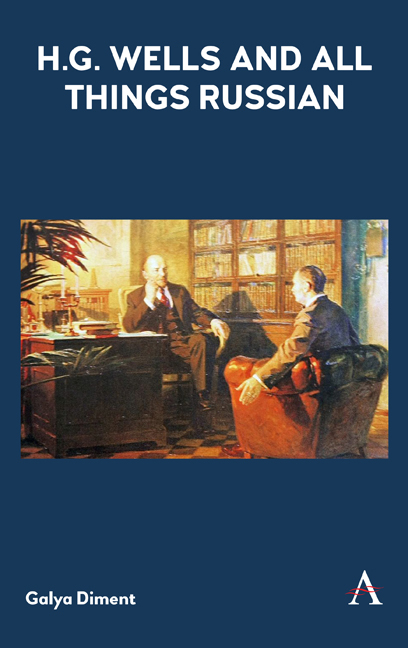Book contents
- Frontmatter
- Dedication
- Contents
- List of Illustrations
- Acknowledgments
- List of Contributors
- A Note on Transliteration
- Introduction: “The Wells Effect”
- Part One WELLS IN RUSSIA: PRE-WORLD WAR II
- Part Two WELLS IN RUSSIA: POST-WORLD WAR II
- Chapter Four “Unregenerate Mass Nature” in H. G. Wells and the Brothers Strugatsky
- Chapter Five Culturology: Yuly Kagarlitsky's Life of Wells
- Chapter Six “Come and Visit Us in Ten Years’ Time!”: Representation of H. G. Wells on the Russian Stage and Screen
- Part Three RUSSIA IN WELLS
- APPENDIX TRANSLATIONS
- Bibliography
- Wells, Herbert George – Works Index
- General Index
Chapter Six - “Come and Visit Us in Ten Years’ Time!”: Representation of H. G. Wells on the Russian Stage and Screen
from Part Two - WELLS IN RUSSIA: POST-WORLD WAR II
Published online by Cambridge University Press: 06 September 2019
- Frontmatter
- Dedication
- Contents
- List of Illustrations
- Acknowledgments
- List of Contributors
- A Note on Transliteration
- Introduction: “The Wells Effect”
- Part One WELLS IN RUSSIA: PRE-WORLD WAR II
- Part Two WELLS IN RUSSIA: POST-WORLD WAR II
- Chapter Four “Unregenerate Mass Nature” in H. G. Wells and the Brothers Strugatsky
- Chapter Five Culturology: Yuly Kagarlitsky's Life of Wells
- Chapter Six “Come and Visit Us in Ten Years’ Time!”: Representation of H. G. Wells on the Russian Stage and Screen
- Part Three RUSSIA IN WELLS
- APPENDIX TRANSLATIONS
- Bibliography
- Wells, Herbert George – Works Index
- General Index
Summary
At the time of Wells's first visit to Russia in 1914, he was already one of England's best known and most widely read authors – his fame resting largely on a series of scientific romances, which were translated into Russian remarkably early, as far back as the end of the 1890s. Even Lev Tolstoy, no admirer of Milton and Shakespeare, was moved enough by his fiction to ask through Aylmer Maude, their mutual friend, to send him a copy of Wells's stories. In 1916 the publishing house of Sytin launched the first edition of Wells's collected writings, 10 volumes of which were released before the 1917 October upheaval. Among others, The War of the Worlds was a continuous favourite and an uncontested bestseller of the day: published in England in 1898, it was translated into Russian the same year, and then reprinted annually up until the 1917 Revolution. The novel drew the attention of Alexander Drankov – a leading pioneer in the domain of Russian filmmaking, who in the early 1910s made an attempt to create the first Russian screen adaptation of Wells's tale, though this was largely unsuccessful due to some insurmountable technical difficulties in producing the working models of Martian vessels.
In Soviet Russia, Wells's literary prominence was not cut short, as happened with so many other ‘capitalist’ Western authors. According to the catalogues of the National Library of Russia (St Petersburg), there are more Russian translations and editions of Wells than of any other prose author writing in English. His enticing social utopianism and his faith in the progress of science continued to have an understandable influence on the generations of the Soviet post-revolutionary authors, including such major figures as Zamyatin and Bulgakov. The situation was different with regard to the reception of Wells in Soviet film-culture. In the country of the illiterate peasant masses, cinema was always seen as a major means of communist propaganda, which was under severe state, and often Stalin's, personal control. The strictness of this censorship was commented upon even by the most sympathetic Western observers. Thus, having stayed in Moscow in 1926– 27, Walter Benjamin, a firm proponent of Marxist ideals, drew attention (in his Moscow Diary, published in Die Kreatur, in 1927) to the extraordinarily politicized culture of the country where, he argued, it was essential to ‘project your thoughts into something like a preestablished field offeree’.
- Type
- Chapter
- Information
- H. G. Wells and All Things Russian , pp. 113 - 128Publisher: Anthem PressPrint publication year: 2019



